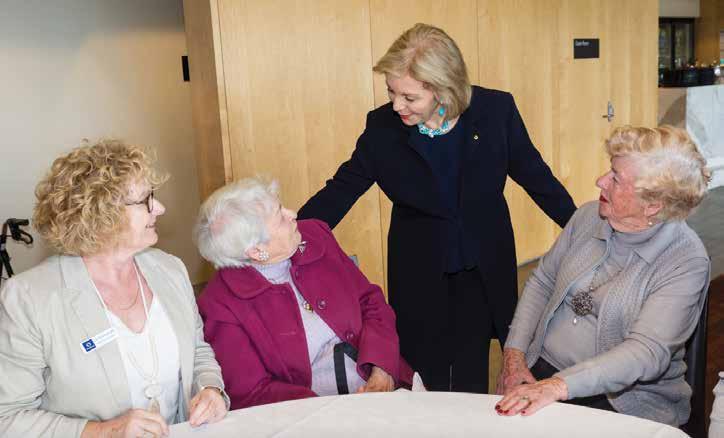
14 minute read
The legend of
She’s one of the country’s living treasures: a publishing legend, best-selling author, advocate for older Australians and those with dementia, and chair of the ABC. ACG publisher Paul Koury sat down to talk with Ita Buttrose.
Paul Koury: Hi Ita. Thank you for your time. I have been looking forward to talking with you for quite a while. You have been a champion for so many wonderful associations and causes within the health and ageing sector.
Advertisement
Ita Buttrose: Thank you and it’s my pleasure Paul. I must say, when I first saw your publication, I thought, what a great idea and a valuable resource it would be for our unpaid carers. There is such a need for information because, as you know, navigating that aged care system is difficult. You don’t know where to go or what help is out there and that’s why I can see the value in a publication like yours. Oh, and I just love the smell of print. It’s better than Chanel No 5!
Paul Koury: Thank you. I thought I’d start by asking you about your love of music. Did you get that from your parents?
Ita Buttrose: Yes, I did. My mother was my first teacher. She was a very accomplished pianist. She used to play with members of the Sydney Symphony. My dad was studying singing at the Elder Conservatorium in Adelaide. So, there’s a lot of music in the family. Even my grandmother used to play music in the silent movies. She could play anything and play by ear without sheet music. Then there’s my uncle Gerald, who turns 100 this year. He’s got a great tenor voice. He and dad were very competitive about who was the better tenor. Music has been in my family for as long as I can remember.
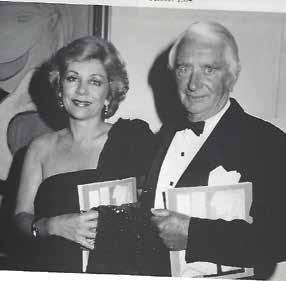
Paul Koury: Do you still play?
Ita Buttrose: I don’t play. Because if you don’t practice your skills, you lose your technique. However my daughter wanted to study the piano, so I gave the piano to her.
Paul Koury: When your father was suffering from vascular dementia, did music play a role in soothing or comforting him?
Ita Buttrose: I’m not sure because as well as dementia, dad had severe hearing loss. and he also had macular degeneration. He really had a very lousy health trifecta. Try as I could, The Macular Disease Foundation didn’t exist, so there was no help for people with macular degeneration. So, I used to go back to the Royal Blind Society to see what they could offer me.
Paul Koury: I ask because there is a lot of data now that supports music as proven to help on stave the deterioration of memory with people suffering from dementia as well Alzheimer’s.
One of the things older people don’t do as a rule is plan. We plan for everything else in our lives. We plan our 21st. We plan our wedding. We plan our children. But do we plan old age? We think we’ll sail into it, but life is full of detours
Ita Buttrose: Yes, we know that now, but we didn’t know that when dad was diagnosed. there wasn’t the sort of support there is today when my father had these things.
Paul Koury: Tell me about your personal experience caring for you father and what you learnt?
Ita Buttrose: I did the best I could to make sure that Dad was always comfortable, and that he had everything that he required, so that he could stay in his own home, which is what he wanted. I used to get very worried about him though because sometimes he’d say to me, ‘those people across the road, they are very noisy. So I went out, and I told them a thing or two.’ When he told me that, I thought, God, I hope he didn’t, but he did and that’s my dad, and he was still able to remain in his own home.
Paul Koury: At that time, did your brothers play a role in help care for your father?
Ita Buttrose: Yes, they did in their own way. My brothers and I would talk often, especially about decision-making. When
Dad was approaching 90, I said to the boys, maybe we should have him assessed by ACAT. Just see if we are doing the right thing, if everything’s alright. Because it’s, dad, I mean, those three conditions are pretty big. Anyway, I told him somebody was coming for coffee, that I’d asked a friend to come over. And so, the lady from ACAT came and I said, ‘Dad, you know, I can’t remember her first name. I said whatever her name was, she’s here.’ And he came out and he’d got beautifully dressed. He had his tie on and he had a blazer, nice pants. Dad was charming. And then, at one point he looked at the woman and he said, ‘You know, people would like to put us older people away somewhere and only have us come out when they ring a cow bell.’ And I thought, oh my God, he knows exactly what I’m up to. I mean, he knew exactly what I was up to. A lot of people assume they don’t have any idea about what’s going on. But believe me, they do. And my dad was a perfect example of that. I’ll never forget it. Dad knew exactly what I was up to. It was so funny.
Paul Koury: What sorts of hands-on tasks did you do for your father?
Ita Buttrose: He liked his food, so I used to do all his shopping and make sure he got a balance of nutritional foods as well as some of his favorite treats. Because dad was losing his vision, I’d write what things were in very large print so he could see and somehow, we managed.
Paul Koury: Today’s carers are sometimes referred to as the sandwich generation. because many are caring for their elderly and their families and are exhausted. What would you say to carers that are feeling overwhelmed, fatigued and close to burnout.?
Ita Buttrose: Great question and it’s a big issue. Carers need respite. I speak to a lot of carers when I’m out and about. As President of Alzheimer’s, Australia. I see hundreds of carers, and I can see first-hand that the majority of them are stressed out. I say to them, ‘Have you got some counselling yourself?’ And invariably, they answer, ‘No, I’m fine.’
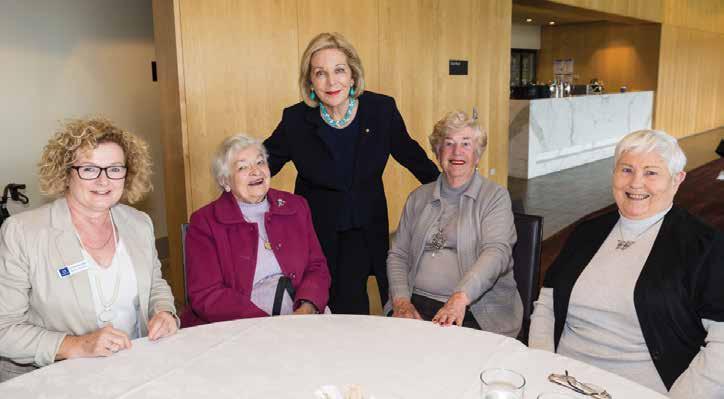
Paul Koury: Carers can be the last ones to admit they need help until it’s too late.
Ita Buttrose: I agree, so I say to them, you know, you should speak with one of our counsellors. They won’t judge you; they’ll just listen. And I said, if you want to say to them, I’m as mad as hell that this happened, or that happened, then just say it. They won’t mind at all. Just speak how you feel about things. I can’t stress enough how important it is to talk your feelings with someone.
Paul Koury: You are so right. I had some counselling during my caring days, and I can remember feeling so much better after talking it out, even though there was no secret fix to my situation. I’ll never forget what my counsellor told me. She said, speaking it out was the key ‘better an empty house, than a bad tent’. How right she was.
Ita Buttrose: That’s a good one. I wish more carers would seek out a counsellor. Carers can be the last ones to admit they need help until it’s too late.
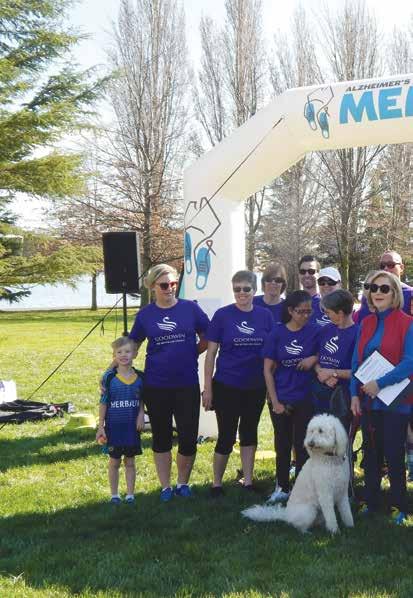
I would also ask them, ’Have you had some respite care? No, I can’t possibly. I can’t possibly leave my mother or my husband.’ And I usually say to them, ‘What do you think he’d say to you if you said you were just in need of a break. What would he say to you? He’d probably say, ’Of course, wouldn’t he? He’d say, ’Take a week off.’ You know, that’s what he’d say, and you have to do that. You have to do it. But it is hard. And I would like to see respite care developed where the carer and the person they are caring for could perhaps both have respite together with the carer not having to do any caring.
It’s no good getting up in the morning and thinking, ‘I’m lonely.’ You’re not the only person who’s feeling lonely. You’re not the only person whose friends have died. But you have to make new friends. You have to push yourself to participate
And you know, we need to address it because of all the carers of people with dementia and all the carers generally, but specifically dementia. If they all withdrew their services, we wouldn’t be able to cope with the load.
Paul Koury: Yes, you’re right.
Ita Buttrose: But just to renew the relationship with the person she or he is caring for. If it’s possible to do that. But there’s a shortage of respite care. It’s always been an issue. Especially, for people with dementia and those living in the country.
Paul Koury: It’s interesting you say that because I’m noticing the trend to multigenerational facilities now for aged care and for respite. I think with the rising cost of living and being time-poor, travelling can be problematic, that for some living independently could be the way to go. As the saying goes, ‘It takes a community to raise a child, it also takes a community to care for the elderly.
Ita Buttrose: That’s true, and you know we do have a tendency in Australia to isolate the elderly. I remember reading something that the anthropologist Margaret Reid wrote a long time ago when I was running Cleo. And it was that we shouldn’t put the elderly away like we do. We should put them in the middle of a town, a village if you like. But she said town so that they’re part of the community. I thought that was such a fantastic idea, that we ran a program on the ABC called, Old people’s homes for fouryear-olds , where you saw those little kids mixing with the elderly.
Paul Koury: Yes, I had heard of that and apparently it was very successful.
Ita Buttrose: Yes, it was. It drove home the point that, once older people, all of whom were lonely, they were all lonely. It didn’t matter where you found them, whether they were in an aged care, whether they were living by themselves in very nice homes, but no friends because everyone had died. And when you looked at the interaction with the kids, they gave the older people an emphasis to start joining in, start doing things and start testing themselves. And that’s what we need to do. We need to make sure the elderly are part of the community in which they live. In the same way that we say that people with dementia have to feel valued and respected in the community in which they live. And we need to make it more dementia friendly. Actually, we need to make it more elderly-friendly.
Paul Koury: I wrote a piece in the very first issue about purpose and feeling needed. I know for my father feeling that sense of I’m no longer needed, also plays into his depression and loneliness.
Ita Buttrose: Absolutely, everybody needs purpose, and it doesn’t matter how old we are. You need a purpose when you get up in the morning. You need to feel useful. And again, the program on the ABC when we did it with teenagers last year, the interaction between the men and the teenager was interesting to watch. They became advisors, they became confidants. We tend to dismiss older people. We have to stop doing that. If you’re lucky, you get to be old and not everybody gets to be old.
Paul Koury: That a lovely way of thinking, I never thought of that.
Ita Buttrose: Not everybody is fortunate enough to get to be old.
Paul Koury: I know that carers often don’t sleep well yet sleep is so important to their well-being. I know you are a great advocate of getting a good night’s sleep What is your routine when preparing for sleep and do you have any advice for our carers?
Ita Buttrose: Truth be told, sometimes I don’t sleep well either. I mean, it is just one of those things, I think. As you get older, some nights you just sort of think, brain stop thinking. So, I might read a book a bit and see if that’ll do the trick. But I think exercise is important. So, I do a lot of exercise and so
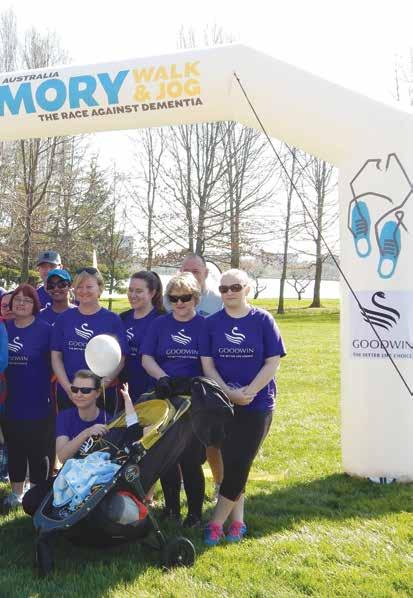
We all know the rules about sleeping. Don’t eat too late. Don’t turn on your computer. Don’t do things that are going to make your brain activated… read a couple of chapters of a book or have a nice bath
Buttrose with her much-loved dog Cleo, who passed away in 2020.
I think you have to wear yourself out a bit. Paul Koury: That’s a good point. I read you also like to walk an hour a day. Do you still manage that now that Cleo you dog has passed?
Ita Buttrose: Well, again these days, I go to a gym four times a week. I do four sessions at a gym now. Yes. And I do walk, not an hour, but I do walk about half an hour every day. If I can, if I can make it.
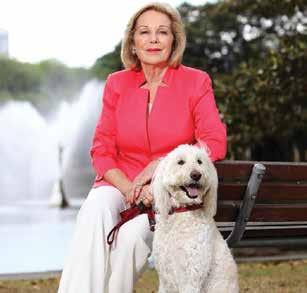
Paul Koury: Ita, I still have so many things Id like to ask you, I think we may just have to make this into a two-part feature article.
Ita Buttrose: Well, caring for you elderly is such a huge topic that I can understand the need for twopart article. We used to run them in Women’s Weekly often.
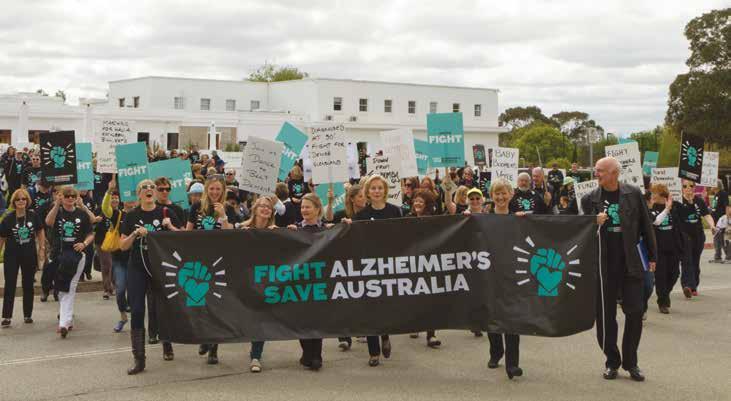
Paul Koury: Thanks Ita, I’ll sign off for now but before I go, I have one last question. One of your brilliant ideas when running Cleo was the introduction of the sealed section centerfold. Do you think something like that could work in the Australian Carers Guide?
Ita Buttrose: Oh, that’s cheeky. Well, you never know. They might all think it would be nice to drop the gear but I think as you get older, you realise that it’s best to keep a little bit of mystery about yourself.
Paul Koury: Thanks Ita, you always had a great sense of humor. Chat again next issue.
Ita Buttrose: Thanks Paul. It was a real pleasure talking with you. ACG
Do you need a break? We’re here for you
At Allity, we are here to support you through the planning of your loved one’s respite care. As a carer, it is important to take time for yourself to rest and recharge.
Whether you are planning a break, have appointments scheduled or should an emergency arise where immediate care is required, we are here for you.
Who can benefit from respite?
• A carer who is unwell needing time to recuperate
• Carers feeling overwhelmed and needing support with a loved one
• GP, Hospital Social Worker or Allied Health Specialist needing a patient care solution
How do I access respite?
• Getting access to respite is as simple as contacting the Allity Home closest to you for more information or assistance
Our Victorian Network
With 17 purposefully designed Homes located across Victoria, the choice is always yours. Be it affordability, convenience, luxury or a combi nation, we are here to provide the support and services that are important to you
Allity is part of Bolton Clarke Group, Australia’s largest independent, not-forprofit provider of home care, retirement living and residential aged care.
• W ith Aged Care Assessment – Standard Respite Fees apply as well as additional services at the Home.
• W ithout Aged Care Assessment – Resident needs to be over the age of 65 and be likely to receive approval on Aged Care Assessment. Should they not qualify, Private Respite Fees apply
Avonlea Aged Care
3–7 Patty St, Mentone (03) 9545 4800
Located in the picturesque seaside suburb of Mentone, Avonlea offers modern and comfortable accommodation and peaceful gardens within a friendly community atmosphere.
Bayside Aged Care
5 McDonald St, Mordialloc (03) 8543 3100
Located 500m to the beach and 300m to the local shopping village, our Home specialises in dementia care. Residents enjoy the privacy and security of their own bedroom and ensuite in a warm, family atmosphere.
Camberwell Green Aged Care
12–14 Hunter Rd, Camberwell (03) 9888 6133
This newly renovated Signature class Home offers aspirational lifestyle and quality services of residential aged care in a small boutique apartment-style environment.
Claremont Terrace Aged Care
231 McKinnon Rd, McKinnon (03) 9964 9000
This newly-renovated Signature Home offers unique and stylish apartments with access to pool, gardens, courtyards and balconies. The Home is known for its exceptional dining experiences, offering choices like no other.
Glendale Aged Care
265 Heaths Rd, Werribee (03) 8742 8888
Glendale offers specialist care for people living with dementia. The Home is unique in its architectural style offering the privacy of generous apartments with ensuite bathrooms and onsite café.
Greenview Aged Care
33–37 Mitcham Rd, Donvale (03) 8841 0800
Greenview is a sophisticated Signature class Home that is newly renovated, offering single rooms with private ensuites and a selection of elegant social spaces to enjoy with family and friends.
Highwood Court Aged Care
359 Warrigal Rd, Burwood (03) 8831 0500
A stylishly renovated Premium Home offering a contemporary home-like environment. There are enclosed courtyards, a quiet library, social lounges and a selection of newly refurbished single rooms with private ensuites.
Lexington Gardens Aged Care
18 Villa Rd, Springvale (03) 9574 6699
A Premium Home completed with 38 new room extensions, offering enhanced dining and hospitality experiences. Onsite café and a variety of different bedroom options with private ensuites.
Lilydale Aged Care
475 Swansea Rd, Lilydale (03) 9739 3300
A newly refurbished state-of-the-art Home located on the picturesque shores of Lillydale Lake. Stylish and modern communal areas and a variety of single and companion rooms designed to ensure comfort and security.
Medina Manor Aged Care
200A Smith St, Thornbury (03) 9290 6400
Located within the heart of Melbourne’s North West, offering large private rooms with ensuites. The Home specialises in caring for people living with dementia by staff specifically trained in dementia care.
Montclaire Aged Care
18 Montclair Ave, Brighton (03) 9596 8858
Located in Brighton, this heritage listed Home is unique, offering elegant private single and couple rooms with ensuites. This Extra Service Home provides peaceful garden courtyards and a variety of intimate sitting areas.
Princeton View Aged Care
29 Heathfield Rd, Brighton East (03) 8591 0200
Freshly renovated Signature Home with the elegance of manor style architecture. Offering onsite barista café, stylish lounge, alfresco spaces and a variety of luxurious single and couple rooms with superior furnishings.
Riddell Gardens Aged Care
Corner Spavin Dr & Riddell Rd, Sunbury (03) 9218 5200
Riddell Gardens in Sunbury has an atmosphere of traditional country charm offering large single rooms with ensuites. Residents can relax and enjoy the peaceful enclosed courtyard abundant with flora and fauna.
Riverwood Aged Care
990 Padman Drive, West Albury (03) 6023 9700
Country comfort and city style with the convenience of shopping centres and services close by, the Home provides a warm and welcoming environment where family and friends are an integral part of the Home’s special community.
Tannoch Brae Aged Care
46 Aldershot Rd, St Albans Park (03) 5248 5814
Located in St Albans Park, designed to ensure comfort and quality care in a home-like environment. The Home offers a peaceful enclosed courtyard, a variety of quiet sitting areas and spacious rooms with ensuites.
Templestowe Manor Independent Living and Aged Care
410–418 Thompsons Rd, Lower Templestowe (03) 9850 8877
A Signature Home that presents quality internal furnishings and landscaped gardens. 20 independent living units co-located with residential aged care with newly refurbished apartment style suites.
Trevi Court Aged Care
95 Bulla Rd, Essendon (03) 9374 3500
Encompassing a friendly community atmosphere where family and friends are always welcome. Spacious, vibrant and classic in style this Home offers the privacy of spacious rooms with ensuite facilities and a variety of quiet sitting areas.
Why hobbies are good for your
It’s not always easy to find free time in the busyness of day-to-day life. Yet, the time when you’re disengaged from your usual obligations – like looking after grandkids or doctor’s appointments – can offer an opportunity to indulge in activities you genuinely enjoy.
Having a hobby is more than just doing something fun – it’s about dedicating time and energy to something that brings you joy and ignites your passions. It’s about being engaged, which can help feed our need for meaning and purpose, things that are sometimes harder to find as we get older and no longer work.



